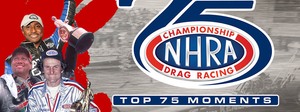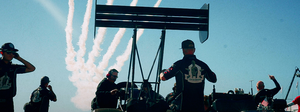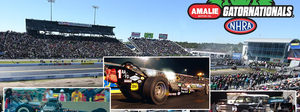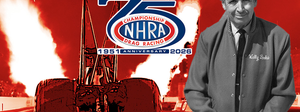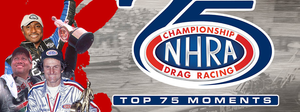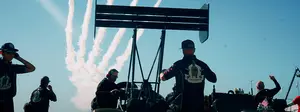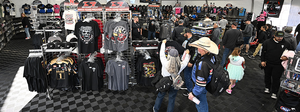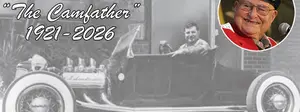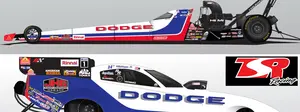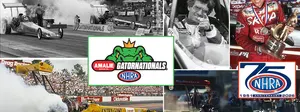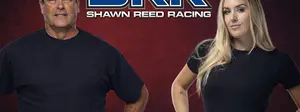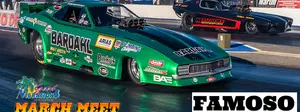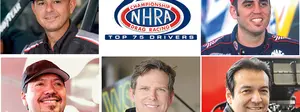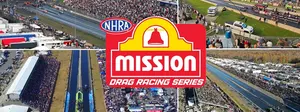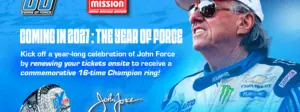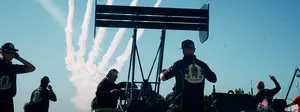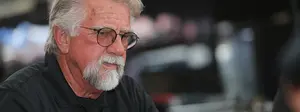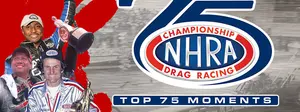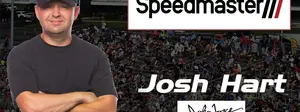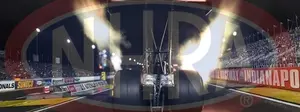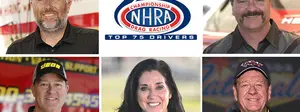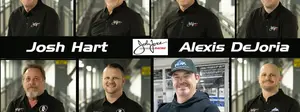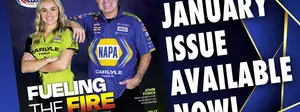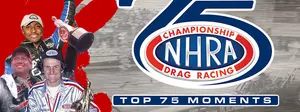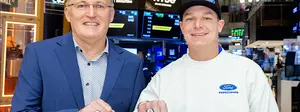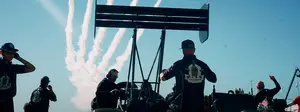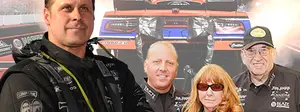In Memoriam
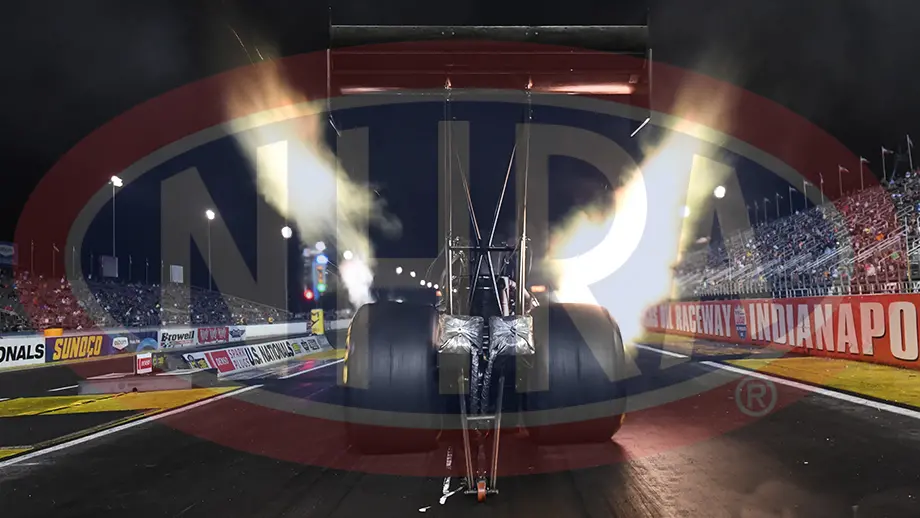
Recent passings of notable figures from within the NHRA world. The NHRA extends its sincere condolences to the family and friends of those we have lost.

Two-time NHRA Sport Compact world champ Paul Efantis died as the result of injuries suffered in a highway accident Oct. 29. He was 41.
A legend and pioneer in sport compact drag racing, Efantis was a second-generation racer. Efantis raced in the NHRA Sport Compact Modified class in a Toyota Solara and won two NHRA championships and set many elapsed time and speed world records.
Efantis is survived by his loving parents “Greek” and Debbie, his three children, siblings Krys and Stephanie and their families.
***

NHRA Sportsman racing standout Glen Self passed away October 27 from COVID. Just two weeks later, his son, Kevin, also died of COVID. Both father and son are past U.S. Nationals winners. Glen having won the event in Street in 1969 and Kevin in Comp in 2016. Glen, a member of the Division 4 Hall of Fame, also won the 1985 Fallnationals in Phoenix and Kevin won the JEGS NHRA Cajun SPORTSnationals back to back in 2008 and ’09.
***

Three-time Division 5 Comp champion Clint Sallee passed away recently after a battle with cancer. He was 69.
Sallee, of Glendive, Mont., was best known for his string of Rocky Mountain Express dragsters. Sallee, a two-time NHRA national event winner, scored his first national event win at the 1994 Mile-High Nationals in Denver and added a second score at the Lucas Oil NHRA Nationals in Brainerd in 2003. Sallee also posted seven national event runner-ups, all in Comp.
Sallee also won 17 Lucas Oil Series divisional events and divisional titles in 1986, 1987, and 2006.
***

Richard Maskin, who possessed one of the finest mechanical minds in drag racing, died Oct. 16. He was 74.
Maskin began his automotive career as a lot man and mechanic at his family's Pontiac dealership. His first serious drag race car was a ‘55 Canadian Pontiac Coupe that ran in C/Modified Production, which was followed by his notable and national record-holding “Mouse Pack” Camaro, which ran successfully in a variety of Modified eliminator classes. In 1972, Maskin partnered with Dave Kanners and later Andy Mannarino in AMC-powered Pro Stockers.
He founded Dart Machinery in 1981 and turned it into a globally recognized aftermarket manufacturer that helped to revolutionize the auto industry, with its premium aftermarket cylinder heads and engine blocks. The company’s first products were aluminum Hemi cylinder heads that dominated the Top Fuel and Funny Car categories. In March 1992, Top Fuel driver Kenny Bernstein broke the 300-mph barrier with Dart cylinder heads aboard. Dart heads have won the pole at the Indy 500 and have also been dominant in NASCAR.
Maskin continued to have a heavy influence, especially in Pro Stock, where he was contracted by numerous teams to improve their performance.
Maskin was inducted into the Michigan Motorsports Hall of Fame in 2015, and in 2019 was the recipient of a lifetime achievement award from the NHRA in recognition of his contributions to the sport and industry.
***

Division 4 Super Comp racer Neil Fry died Oct. 11. He was 68. Fry went from street racing to the track and raced rear-engined dragsters in Super Comp for years. Fry, an engineer at Solar Turbines until his retirement, held a patent on a fuel system for a gas turbine. He battled complications of diabetes for many years but continued to race. His last project was the completion of a new Ray Alan dragster for Super Comp but illness forced him to the sidelines without getting to drive his new creation. He is remembered well for his big smile and laugh by family and his many friends.
***

John "Tarzan" Austin, one of the colorful figures on nitro drag racing in the 1970s, died Oct. 8, after complications from a stroke. He was 80.
Austin grew up in Southern California’s car-crazed San Fernando Valley, and was a member of the Throttle Merchants car club. His first trip down the dragstrip was in cub member Ted Worby’s supercharged Chrysler Hemi-powered AA/Gas dragster
Austin acquired his tree-swinging nickname as the result of his long-haired and physical appearance and strength –- his 9-to-5 was a bouncer at a local Valley bar -- and his unique voice
Austin tuned Arnie Behling to the Top Fuel victory at the 1971 NHRA Summernationals and also toured regularly with “T.V.” Tommy Ivo.
In 1972 Austin drove Greg Scheigert’s Hot Tuna Top Fueler until he crashed the dragster at the 1974 Gatornationals and Scheigert retired from racing.

In 1975, Austin drove the Bluegrass Shaker Funny Car and finished second in the NHRA Division 3 championship points that year but a massive engine explosion and fire near the end of the season left him with burned hands and no ride and, which helped him decide to retire as a driver and stay involved as a crew member for various teams.
Austin went to work at Raymond Beadle’s Chaparral Trailers in Dallas, where he learned to build trailers for a lot of his racer friends.
***

Two-time NHRA Division 4 Top Alcohol Funny Car champ Dal Denton passed away Oct. 7 after a long battle with cancer. He was 60.
Denton, of Del Valle, Texas, won Division championships in 1985 and 1986 with his Sudden Pleasure Trans Am; his ’84 divisional crown also carried him to a lofty fourth-place finish in the world championship battle.
Denton, the 1988 IHRA Funny Car world champ, carved out a second career as an in-demand driver and crew chief in Europe for Top Fuel and Alcohol Funny Car teams, and also drove nitro Funny cars and jet dragsters.
Away from the racetrack, Denton also was a world champion on his cutting horse.
Before Denton became ill, he was working with his son, Daniel, preparing for him to follow in his father’s footsteps on the dragstrip.

***

Fuel system guru Ralph Gorr lost his battle with Parkinson's Disease on Sept. 18. He was 69 Ralph and his son Spike have been the go-to guys for fuel system flowing and more since 1980.

Gorr started out racing in the early 1970s, building a gas dragster in his father’s basement (he had to disassemble the car to get it out). In 1974, he made a trip to California to have his Lenco transmission converted to a 4 speed. Before he made it to all the way to Lenco, he met Dale Armstrong, who invited him along on a trip to the U.S. Nationals and eventually went to work for Armstrong and the man whose shop was next door shop, Billy Williams, learning from the best.
Not long after, Gorr went out on his own, building engines for the likes of Sewell family, where he found a lot of success and caught the eye of Connie Kalitta, who had Gorr build the first engine for son Scott.
Gorr was an innovator, building the first makeshift spin fixture to test valve springs. With nothing but a strobe light and a tape recorder, he learned all he could. When his testing was done he turned that machine into a fuel flow bench, and by 1980 was flowing fuel systems for the masses and became the first to provide such a service to the racer both on and off the track.
***

Chris Vandergriff, Hedman Husler Hedders General Manager/President and Director of Racing, died Sept. 21 of complications from a major heart attack. He was 51.
Chris was the son of longtime drag racing impresario Bob Vandergriff Sr. and brother to Top Fuel driver/owner Bob Vandergriff Sr.
In addition to his aftermarket work, the younger Vandergriff also competed in Top Fuel in 2003 and in Super Comp.
Vandergriff is survived by his daughter Chase, Chris, father Bob, sister Elfie, and brothers Bob Jr. and Kevin.
***

Sam Biondo, one of the Northeast Division’s most popular and influential sportsman racers passed away on August 19 following a long illness. The father of NHRA world champions Sal and Peter Biondo and sister, Christa, Sam was a pioneer in the world of E.T. bracket racing and was nearly unstoppable, winning countless races at tracks surrounding his New York home. Biondo also won the Super Stock title at the 2002 Englishtown event, sharing the winner’s circle with son, Peter, who won in Stock. Biondo was also successful in business, founding Biondo Race Products, a leading supplier of drag racing electronics and driver aids.
***

Kansas-based Top Fuel racer Dale Wilch passed away Aug. 10 of COVID-19. He was 77.
Wilch, a U.S. Navy veteran from Kansas City, Kan., began his racing career at the wheel of a ’37 Chevy. In the late 1960s he began working at Don’s Speed Shop in Lawrence, Kan., and soon took the reins of a series of front motored dragsters for Don Baxter. They raced all over the Midwest in Jr. Fuel and eventually moved up to Top Fuel in 1974, campaigning the chevy-powered Jayhawker. In 1976, Wilch and Pat Holt unveiled the K.C. Bomber after the newly-released movie Kansas City Bomber, which starred Rachel Welch, which Wilch figured was close enough to his name. The highlight of that season was qualifying at the NHRA Springnationals at an even where the DNQ list read like a who’s who of Top Fuel stars of the day. Wilch raced in Top Fuel on and off through 1982, when he turned his attention to his ever-growing speed shop in Kansas City. He and his wife Denise ran a mail-order parts business selling new and used speed equipment in addition to Dale Wilch’s Man Cave, a weekly indoor swap meet located in the underground caves on the Western edge of downtown Kansas City, Mo.
***

Vic Morse, a West Coast match-race standout in the early days of Funny Car, died Aug. 7. He was 80 and had been battling pulmonary fibrosis. After driving the Specialty Automotive Top Fueler in Eugene, Ore., in the 1960s, he moved to Southern California in 1969 and hooked up with regional car dealer Mister T to field the Mister T Corvette.
***

Arnie Karp, who with partner Keith Hughes fielded the popular Boston Strangler Top Alcohol Funny Car in the 1980s, died July 14. He was 74. Karp won four national events in his career, including back-to-back wins at Le Grandnational in Canada in 1983 and ’84, the first two wins of his career/ Karp also won the 1986 Summernationals and the 1986 NorthStar Nationals in Brainerd. Three of his four-final-round victories came over the class’ all-time great, Frank Manzo.
***

Former NHRA Top Gas world champion Jack Jones, a two-time U.S. Nationals winner, died July 10. Jones won the U.S. Nationals in 1968 and 1970, and also captured the world championship title with his victory at the 1969 NHRA World Finals in Dallas.
Long-time Division 1 racer Mark Markow unexpectedly June 26. He was 57. Markow, the owner and fabricator at Markow Racecars of South Windsor, Conn., built, maintained, and raced for more than 30 years in the Northeast and beyond.
***

Wayne Clapp, a seven-time NHRA national event winner in Comp and Pro Comp, died May 23 after a long battle with cancer. He was 75. Clapp won six times in Comp from 1975 to ’78 and won his final event in Pro Comp at the 1979 Cajun Nationals. He experienced great success with ca oner Dean Thompson and engine builder Jack Roush with a variety of cars, including a flip-top, Funny Car-style A/EA Mustang II.
***

Robert Eakins of East/West Clutches died June 22. Eakins’ family-owned East West Engineering, which developed clutches for Top Fuel, Pro Stock, and Top Alcohol Dragster clutches applications. Eakins, who was part of the Over the Hill gang that fielded Top Fuelers and Funny Cars in the 19709s and ‘80s, most recently competed in Top Alcohol Dragster with son Randy.
***

Craig Morrison, son of chassis and suspension guru Art Morrison died June 13 due to complications from COVID-19. He was 46. The younger Morrison, who competed in Super Gas with the Art Morrison Enterprises “Project Super Glass” 1955 Chevy, became AME vice president and was the impetus behind the creation of the Morrison GT Sport chassis, an important cornerstone in the “Restomod” movement.
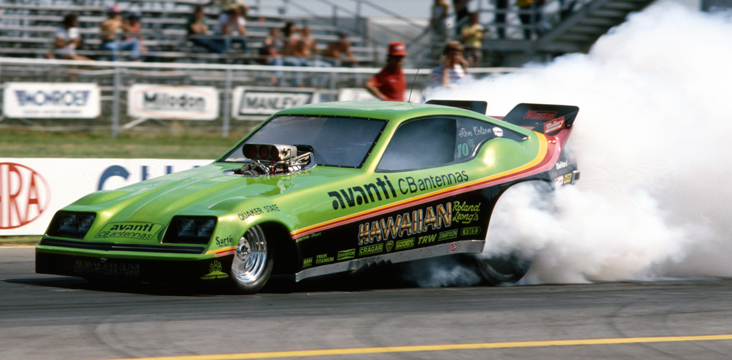
Ron Colson, who drove Top Fuel dragsters and Funny Cars for decades and followed with successful businesses in television publishing and consultations, died March 19. Colson was best know for a Funny car career that included rides in two of the sport's iconic cars, the Chi-Town Hustler and the Hawaiian. Colson later founded Colson Communications, a firm that immediately found roots in television production of drag racing events. [Read more]
***
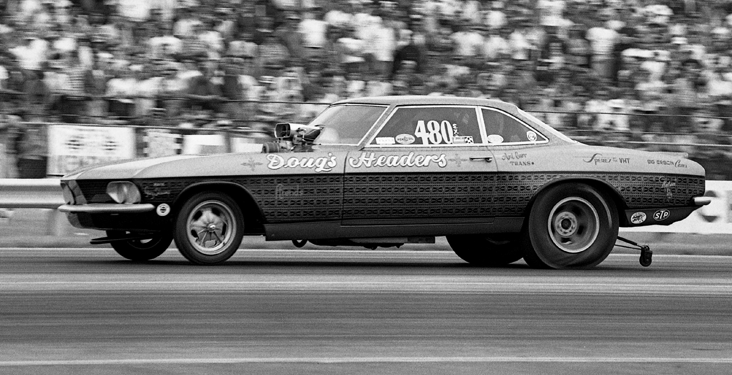
Doug Thorley, who not created an aftermarket titan in Doug’s Headers in 1958 but also competed in a number of classes, highlighted by his Funny Car victory at the 1967 NHRA U.S. Nationals, died. He was 92. Thorley's scored his Indy victory in his Corvair Funny Car at the ’67 race, which was the first Indy event to ever feature the class and only the second to showcase them after their debut at the 1966 World Finals. [Read more]



